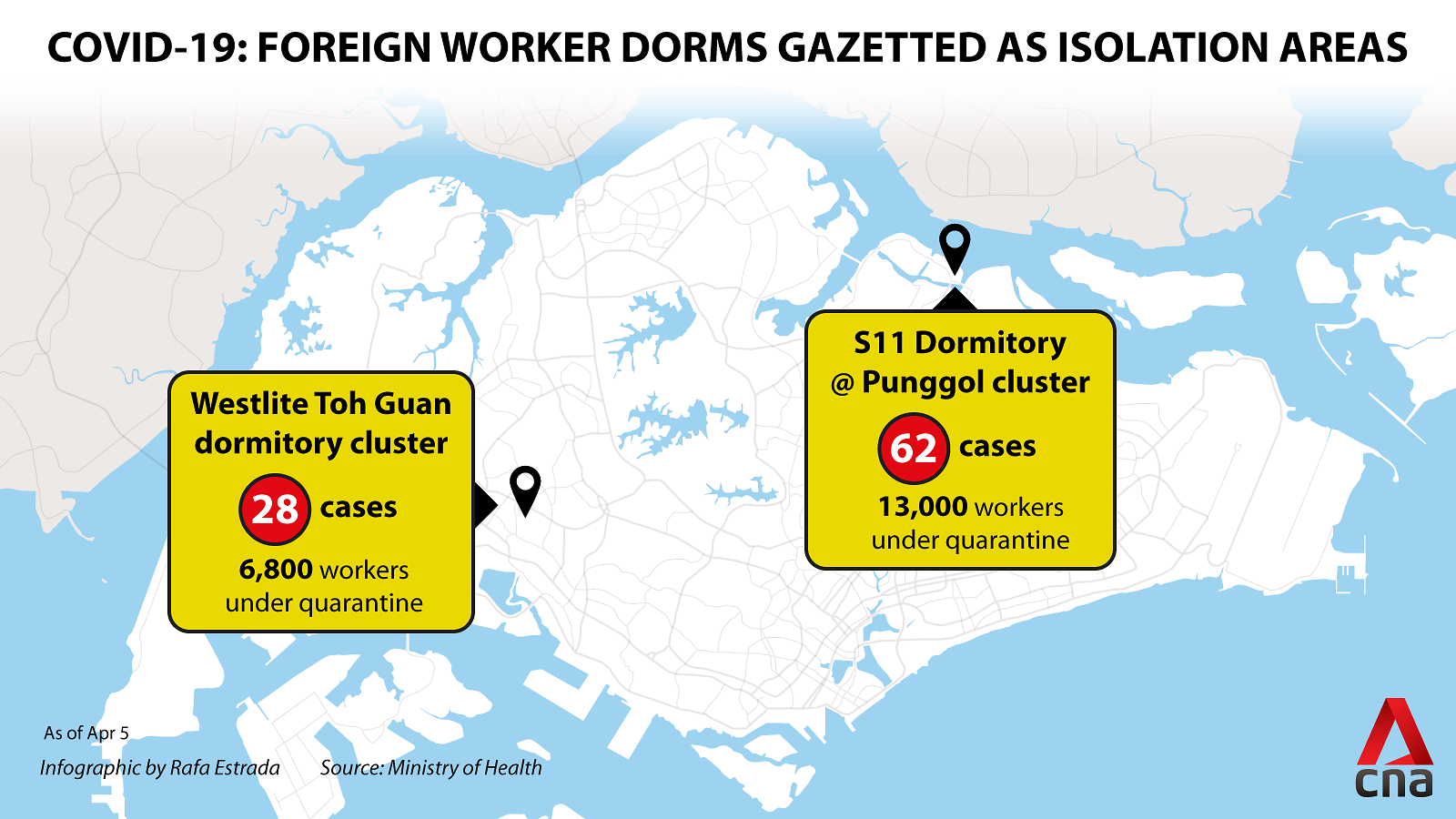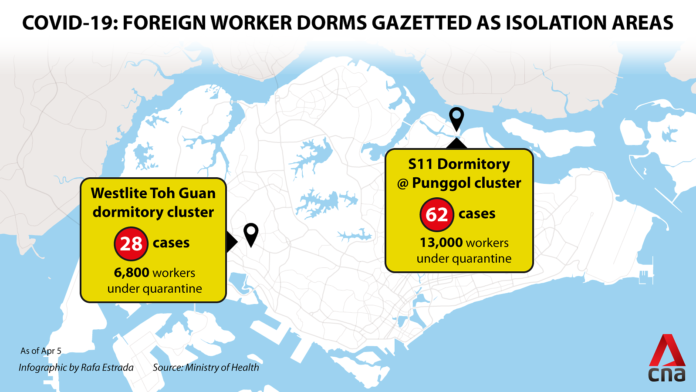SINGAPORE: Two foreign worker dormitories that have seen a “significant” climb in new COVID-19 infections have been gazetted as isolation areas to prevent further spread of the coronavirus.
This will see all 19,800 foreign workers housed at S11 Dormitory @ Punggol and Westlite Toh Guan dormitory being quarantined in their rooms for the next 14 days, a ministerial task force to tackle COVID-19 announced on Sunday (Apr 5). Both dorms account for a total of 90 COVID-19 cases so far, with the larger cluster in S11 Dormitory.
Further safe-distancing measures will also be rolled out at all other foreign worker dormitories in Singapore.
Explaining the move, Manpower Minister Josephine Teo said: “The key objective of all these measures is really to ensure the health and well-being of everyone. Not just Singapore citizens, but also foreign workers who are here, helping our economy, and their employers.
“We want to give foreign workers the assurance that these measures are taken in their interests, and their well-being,” she said at a news conference.

MOOD AT TWO ISOLATED DORMITORIES “STABLE”
The mood at the two isolated dormitories is “stable” and workers generally understand the need for these precautionary measures, said Ministry of Manpower’s (MOM) deputy secretary of workplaces Jason Chen at the same news conference.
Free meals and goodie bags with masks, thermometers, hand sanitisers and snacks will be given to the workers to “lift their spirits”, he said.
Workers who are symptomatic have already been isolated.
Precautionary steps have also been taken to protect workers who are well, with access to recreational facilities being regulated to reduce the inter-mixing of workers.
READ: Singapore sees record daily spike of 120 COVID-19 cases, ‘significant number’ linked to workers’ dormitories
READ: Singapore Expo being prepared to house COVID-19 patients who have recovered but may still be infectious: Gan Kim Yong
Movement between blocks is prohibited and workers have been advised to “cease social interactions with others who do not reside in the same room or floor”, said a joint press release from the MOM and the Ministry of Health.
As support during the quarantined period, workers at these two dormitories will also receive onsite medical support and enhanced health screening. This includes checking and reporting their temperature twice daily and regular monitoring for fever and respiratory symptoms.
Those unwell will be isolated and assessed by medical personnel for further attention, said the two ministries.
Remittance services will also be facilitated onsiteas authorities understand that it is important for workers to still be able to make remittances back home, said Mrs Teo.
Affected workers will not be going to work, but will continue to be paid. This as the quarantined period will be considered as paid hospitalisation leave, which is part of their leave eligibility under the Employment of Foreign Manpower Act. Employers may claim the S$100 daily quarantine allowance.
File photo of Westlite Toh Guan dormitory. (Photo: Hanidah Amin)
MEASURES TO BE ROLLED TO OTHER DORMITORIES
MOM is working closely with all other dormitory operators to implement similar measures within their premises with immediate effect.
Workers employed in essential services – a “small minority” of those living in foreign worker dormitories – will be moved out and housed separately.
“We are actively converting more spaces, and moving essential services workers into these spaces which are suitable for this purpose,” Mrs Teo said.
Authorities are looking at a range of accommodation options for them, such as vacant HDB blocks, according to National Development Minister Lawrence Wong.
READ: COVID-19: Heng Swee Keat to announce third round of support measures in new ‘Solidarity Budget’
Interactions between workers will have to be further minimised across all foreign worker dormitories. Not only will movement between blocks be prohibited, workers will have to minimise interactions between floors, said Mrs Teo.
Additionally, authorities will “further thin out” the number of people living in these dormitories and this will be progressively done for all large dormitories, she added.
Unwell workers – even those who do not test positive for COVID-19 – will be relocated to isolated sick bays to “minimise the risk to everyone else”.
With the emergence of foreign worker dormitories as a “large cluster”, Mr Wong, who co-chairs the multi-ministry task force, said there is now a need to focus on dormitories as a separate category within the issue of locally transmitted cases, and to develop a “dedicated strategy”.
MORE MEASURES AT THE DORMITORIES THAN WITHIN THE COMMUNITY
When asked whether there was greater risk of transmission of COVID-19 at these dormitories, Mrs Teo said the ministry had implemented more measures for the dormitories, as compared to the wider community.
Operators of workers’ dormitories were already required to adopt additional measures to minimise the risk of COVID-19 transmission since Apr 1.
“If we compare the kind of steps that have already been implemented at the dormitories, which I outlined to you earlier, for example, staggering the meal hours, staggering their recreation times, and going to the extent of ensuring that between blocks of foreign workers that are staying in dormitories, there is no intermingling,” Mrs Teo said.
“These are not even measures that are being taken at the community until very recently,” she added.
READ: Dormitory operators required to adopt additional measures to minimise risk of COVID-19 transmission: MOM
Addressing the same question, Mr Wong stressed that foreign workers are not “inherently” at “higher risk” compared to locals.
“It’s not an issue of targeting a particular group … The issue we are facing here is that foreign workers dormitories themselves have now emerged as a cluster of infection, a new vector for transmission, despite the precautions we have already taken,” he said.
In response to another question on whether these measures for foreign worker dormitories could have been done sooner, Mr Wong said: “We were always very concerned about the risk and that’s why baseline precautions were already taken.”
While more had to be done, preparations such as locating a new space with proper infection controls and security arrangements, needed time, he said. “It doesn’t just happen overnight.”
Authorities said they will continue monitoring the situation and will declare more dormitories as isolation areas when necessary.
“We may not stop at these two dormitories … We will continue to monitor the situation and decide as we go along,” said Health Minister Gan Kim Yong.
BOOKMARK THIS: Our comprehensive coverage of the coronavirus outbreak and its developments
Download our app or subscribe to our Telegram channel for the latest updates on the coronavirus outbreak: https://cna.asia/telegram





